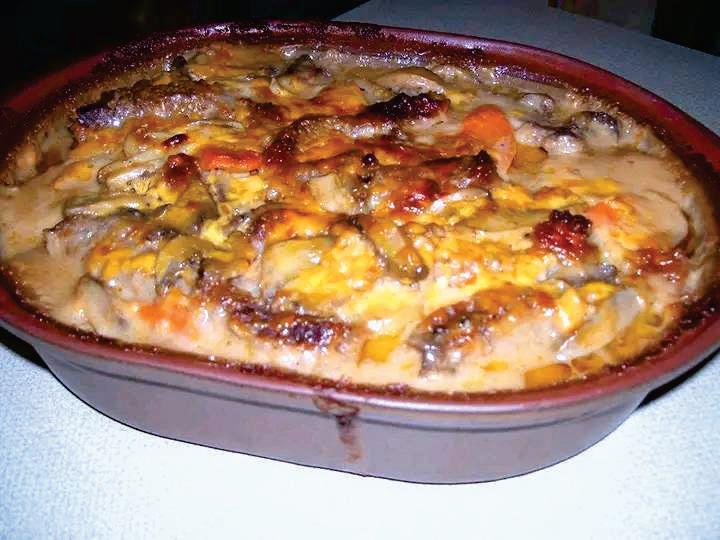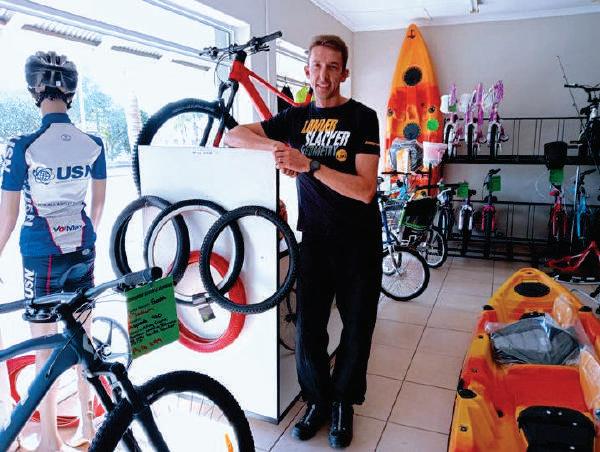
5 minute read
NOORD KAAP TUINE
Lekker Steak En Groente Gebak
Genoeg vir 4 - 6 persone met rys en slaai daarby
Advertisement
1 - 1½ kg tenderised steak in repies gesny of blokkies, nes jy wil
2 uie in ringe gesny
1 x 250g pak sampioene gekerf of 1 groot blik gekerfte sampioene

2 groot aartappels in dikkerige skywe gesny
4 groot wortels in repies of ringe gesny


1 kop gerasperde beleë kaas of cheddarkaas
Gegeurde meel om steakrepies mee te bedek
SOUS

250ml 2% lae vet melk

250ml volroom of yoghurt (ongegeur)
2 hoogvol eetlepels mayonaise





3e chutney
3e tamatiesous
1e fyngedrukte knoffel
2e worcestersous

3e mosterdsous
½ pakkie bruinuie soppoeier
1 pakkie "onion and bacon Potato bake”

Suurlemoenpeper en Flippen Leka Spice na smaak of Steak en chops speserye na smaak.
Meng al die sous bestanddele goed saam en hou eenkant.
SO MAAK JY
Neem oondskottel, gooi klein bietjie olyfolie op die bodem en pak lae van die groente en steak daarin. (Gooi steakrepies in die meel en skud oortollige meel af)
Herhaal die lae tot al die groente en vleis gebruik is. Gooi nou die sous bo-oor
Strooi nou die kaas bo-oor. Bak in vooraf verhitte oond of konveksie-oond op 160°C vir 'n uur en 15 minute of tot gaar
WENK
Jy kan hierdie met gemak as 'n potjie in platboompan doen met kooltjies op die deksel. Jy kan die dis afwissel deur hoenderrepies of stukkies wors ook te gebruik ipv steak. Heerlik en vullend, bedien met rys of slaai.
Bron: Facebook Ouma Se Resepte/ Suidwesters Kan Lekker Kos Maak

Vrydag 27 Januarie 2023
Afurniture designer learns "ancient woodworking techniques" to bypass the need for electricity.Aconstruction business gets creative just to keep water pumping into its toilets.Aformerly packed conference centre becomes a "ghost town".
Entrepreneurs from all over the country responded to News24 to share their stories of how load shedding was scuppering their progress or, in some cases, catapulting them backwards.
Faced with exorbitant costs due to unprecedented power cuts, business owners are resorting to extreme measures just to keep their doors open. Still, many the risk of cutting jobs or closure.

'Economic suicide’
Some regret having decided to expand.
"This is economic suicide. No government should do this to its people," says Huzayfah Navlakhi, the owner of Grand Butcher Shoppe in Johannesburg.
"I opened a small store about seven years ago and expanded it to three shops during the last few years. Usually, expansion is a great thing for any business, but due to the impact of load shedding, I think in hindsight it seems to have been an error in judgement," says Navlakhi.
"Equipment breakdowns and stock losses in 2022 put me out of budget for close to R500 000, and I'm under huge pressure.The cost of alternative electricity options is also extremely pricy for us."
Power outages impact phone reception and internet accesstherefore, the ability to be in contact with clients, entrepreneurs said.
Amixed bag of load shedding and often faulty substations has forced Sajjaad Variawa to close his bakery in Mayfair, Johannesburg.
"I had a list of restaurants I used to supply, but because of the unreliable electricity, I could no longer do so and lost customers," says Variawa.
His remaining bakery in Northcliff is now also facing closure due to the high cost of running a generator
Rage against the machine
Owners of manufacturing businesses are losing up to 50% of their productivity due to the extent of load shedding and the impact on running their machines.
Warren Waterston is the owner of Robiq in Cullinan outside Pretoria. He manufactures various items for the security and dog markets.
"My business is on the brink of collapse after 33 years of success. How do you pay staff full wages when they [can only] work less than half the day? How do you pay rent and insurance when you turnover less than half you did five years ago?" asks Waterston. "Surely big industry should be putting more pressure on government to resolve the electricity issue?"
Lyndsay Cotton's business near Pretoria designs and manufactures roof trusses and employs 50 people onsite and about 100 subcontractors.
"Load shedding means that we need to find alternative methods to supply electricity to pump water for drinking, toilets, and operations, to keep machines running, servers running and, and keep the lights on. Without electricity, we must shut the business down," he says.
The R60 000 a month to run a generator is not sustainable for his business, he says.
The owner of a plastics manufacturing business in Pretoria explains that the machines take hours to heat up, so require a 24-hour operation, which is not feasible. Load shedding has reduced his productivity by 50% and increased the amount of scrap material he has to throw away
"I do not have the money to buy a big generator to supply the 150kva we need to keep running. Even if I did, the size factory I am in has no space to place a generator, let alone the diesel required to run it," he says.
Even armament manufacturers are not spared.The owner of a small business in Gauteng involved in weapons manufacturing says load shedding has even impacted the ability of the relevant government department to issue the necessary permits to manufacturers.
Afurniture designer and manufacturer says he has now had to learn "ancient woodworking techniques" to move away from tools which require power. It now takes him more time, but he does not dare increase his prices.
Apanel beater writes that it now takes double as long to get a job done due to load shedding, leading to having to work weekends just to get things done.
Ghost town
Load shedding is taking its toll on the hospitality industry as well.
Nhlanhla Mabaso of the Elizagrace River Lodge in the Tonga settlement of the Nkomazi Municipality in Mpumalanga started with just two rooms in 2008 and grew his guesthouse to 26 rooms, a conference hall, bar, music recording studio, and other amenities in just a few years.
"At that point, I felt like a responsible citizen who was not only creating wealth for myself and my family but also helping ten [employees] put bread on the table and their children through school," says Mabaso.
The guesthouse was popular with locals and visitors from Mozambique and Eswatini, especially over weekends when they came to enjoy the airconditioned thatched rooms.
"This is now a distant memory as my establishment is beginning to take the form of a ghost town thanks to load shedding," says Mabaso, who might be forced to sell his property
"It's merely pride that I will lose with the possible closure of the business, but it will be devastating for my employees with whom I have developed a great family bond.There's hardly anything I can do now," he says.
The owner of a small restaurant writes that, due to load shedding, they can only offer half their menu as their backup battery supply is only enough for 90 minutes.
"The financial model of restaurants has been under pressure for some time now. Load shedding is the death blow," he says.
Gone offline
Online businesses are also hard hit.
David Jesse is the owner of David Jesse Publishing based in Durban. He employs ten people and does copyright, editing and ghostwriting for the US and UK markets.
He is required to have a download speed of 30mb/sec and continuous electricity and wifi supply. Due to often having 10 to 12 hours of load shedding a day in his area, his overseas employers have repudiated his contracts, and he has had to close his business. -















